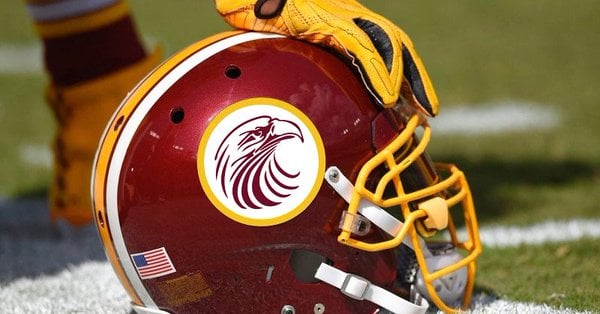A Native American activist group is claiming credit for a set of websites resembling those of at least four major news organizations that claimed Washington’s NFL team has changed its name to the “Washington Redhawks.” The websites appeared Wednesday morning. The pages, copying the looks of the Washington Post, Sports Illustrated, ESPN, and Bleacher Report, along with a WashingtonRedhawks.com site that mimics the actual team’s website, circulated on social media after being promoted by other Native activists, who provided real quotes to a set of fake-news stories.
Rising Hearts, a DC-area group, revealed itself on Wednesday afternoon as the creator of these sites, stating in a press release that they are part of a “culture-jamming” effort to push Washington’s NFL franchise to change its name, which is widely defined as a racial slur against Native Americans. “We created this action to show the NFL and the Washington Football franchise how easy, popular and powerful changing the name could be,” Rebecca Nagle, a Rising Hearts organizer, says in the document.
Despite the sites’ obvious falsehoods—a mid-season rebranding seems highly unlikely, to say nothing of the fact that the team is as adamantly opposed as ever to a name change—the apparent hoax is elaborate enough to look somewhat official. “Dan Snyder honors Native Americans, changes team mascot to Washington Redhawks,” reads the headline on the site claiming to be ESPN. “Native Leaders Celebrate a Victory as Washington Football Changes Mascot to the Redhawks,” states the one imitating the Post. Quotes are attributed to team officials, including Snyder and Head Coach Jay Gruden. There’s even a hashtag, #GoRedhawks.
While Rising Hearts did a good job copying their targets’ appearances—the faux-ESPN and –Sports Illustrated pages even have drop-down menus that open when the cursor passes over them—it’s still easy to spot a fake. The URLs alone are giveaways. Sites like washpostsports.com, si.nflbreaking.com, and espnsports.news are not used by the news organizations they claim to be. Stories are also attributed to “staff writer,” an oddity for publications that typically withhold bylines only on wire copy or editorials. And much of the copy uses phrasing that echoes the activists’ condemnation of the Washington team’s name: “The team’s statement doesn’t reveal the final catalyst for the change, but the public can assume that racist imagery is becoming less and less popular with the liberal fan base in the D.C. metro area given the current political climate,” the fake ESPN story reads.
But where these phony websites truly jump off from other instances of fake news is that Nagle and her fellow organizers actually went out and interviewed other Native American activists for real reactions to the fictitious achievement of a very real goal. “They wanted a quote from me about how I’d feel if they changed the name,” says Adrienne Keene, an assistant professor at Brown University, who appears in the fake Post story. “The quotes in two stories are from an actual conversation with me.” The fake Post story also quotes Washington fan Ian Washburn, who was featured in a real Post story in 2014, about his decision to give up his season tickets out of disgust with the team’s name.
Nagle says the planning for this stunt began in late summer 2017. She says she and her fellow Rising Hearts organizers anticipated the sites’ authenticity would be questioned almost immediately. “It’s not meant to be believed,” she says. “It’s meant for people to see a logo. For the Washington football team to be seen as something not connected with racism and genocide, all they have to do is change four letters. Native advocates have done everything including litigation to get the team to change its name.”
She adds that Rising Hearts figured a collection of phony-news websites—she calls them works of satire—would be a good way to stoke up the controversy about the Washington team’s name after the setback Native activists suffered in June when the US Supreme Court issued a ruling that improved the team’s legal standing. In that case, the court ruled unanimously that the Slants, an Oregon band whose lineup consists of Asian-American musicians, had the right to register federal trademarks for its name, even though it refers to a slur against people of Asian descent. The Washington team had lost its trademark protections in a lower-court case brought by activists, but will get them restored on the merits of the Slants decision.
Until the press release, Rising Hearts had done a good job masking itself. The five sites were all registered on November 26 to a “Dan S” residing in Paris. (A likely wink at Snyder, who lives in Potomac.) Digging deeper into those records reveals that they are hosted on a server linked to a mysterious domain called ponytelecom.eu. But the trail goes cold there. A registration search on ponytelecom.eu spits back EURid, which administrates the .eu website suffix under the authority of the European Union.
Not everyone’s amused by the satire, though. “This morning, the Redskins organization was made aware of fraudulent websites about our team name,” the real Washington NFL team says. “The name of the team is the Washington Redskins and will remain that for the future.”
Nagle says Rising Hearts is following up its website stunt with a press conference Thursday at Robert F. Kennedy Stadium, and a rally outside FedEx Field on Sunday before Washington’s game against the Arizona Cardinals.



















